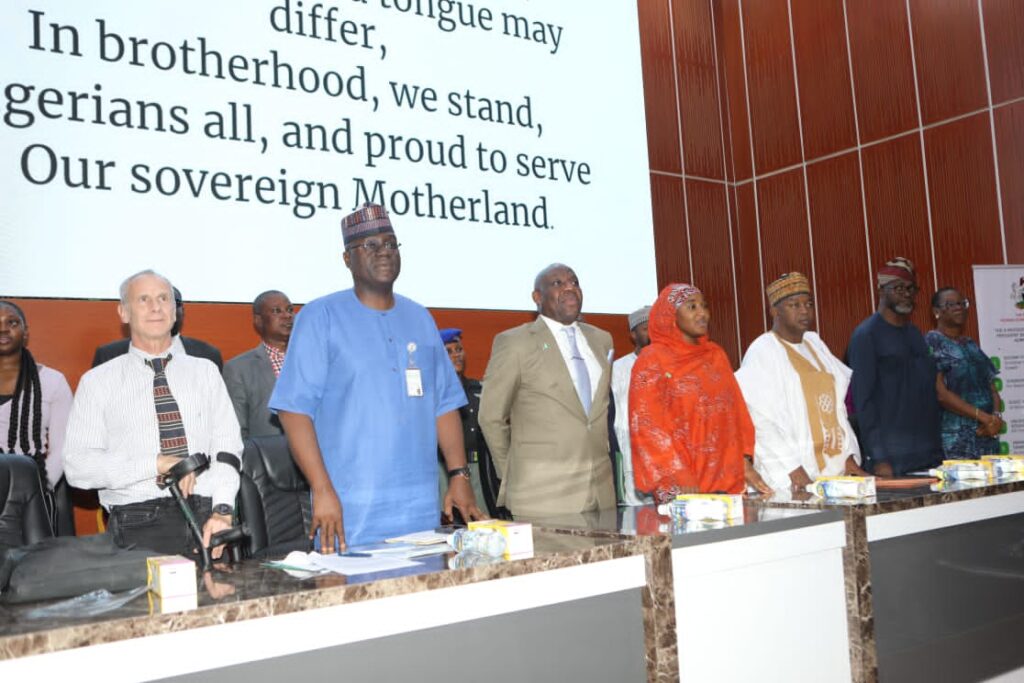Kabiru Haruna
The Federal Ministry of Education, under the leadership of Minister Dr. Maruf Olatunji Alausa, has reiterated its commitment to overhauling Nigeria’s education system during a recent Citizens and Stakeholders Engagement on the education sector.
The engagement focused on outlining strategic priorities, unveiling key initiatives, and addressing lingering challenges such as the alarming rate of out-of-school children.
In his address, Dr. Alausa highlighted six core priority areas of the ministry, including reducing the number of out-of-school girls, strengthening quality assurance, and expanding access through targeted national programs.
Education Minister Proposes Two-Year NYSC to Boost Skills
Among these efforts is the Nigeria Education Sector Renewal Initiative (NESRI), a comprehensive framework aimed at transitioning Nigeria from a resource-dependent economy to a knowledge-driven one.
The initiative focuses on literacy improvement, data digitization, and curriculum reform.
The forum also spotlighted recent milestones such as the inauguration of 10 governing councils, the licensing of 11 new private universities, and the rollout of digital platforms to support quality assurance.
A key highlight was the LUMINAH Girls’ Dual Initiative, which aims to enable one million girls to complete basic education by 2030 across 12 pilot states.
Minister of Education Commends JAMB’s Examination Integrity
In a related move, the AGILE project, initially implemented in 18 states, has now been expanded to 11 more.
The Minister raised concern over the staggering figures of out-of-school children—estimated at 15 million—with an additional 45 million classified as learning poor.
To address this crisis, 25,000 children have been integrated into formal education through NESRI, while 4,000 Tsangaya teachers have been trained to support inclusive education.
Efforts to improve technical education were also emphasized. The Ministry is collaborating with both local and international partners to bolster Technical and Vocational Education and Training (TVET) and STEM programs.
Notably, enrolment in health-related fields has seen a remarkable increase from 28,000 to 115,000 students, with 18 institutions selected for high-impact development.
On the digital front, over 202,000 students have benefited from the education data repositioning initiative aimed at reducing reliance on foreign statistics.
Furthermore, 3,198 teachers have been trained through an online digital quality assurance program, accompanied by a revised primary curriculum and a new teacher development framework.
The forum also featured the launch of a National Policy on Anti-Bullying in Schools, with Minister of State for Education, Professor Suwaiba Sa’id Ahmad, inaugurating the Anti-Bullying Committee.
The committee, which includes prominent education stakeholders such as Hajia Binta Abdulkadir and Mrs. Boriowo Folasade, has been tasked with implementing practical guidelines to tackle bullying in schools nationwide.
In her welcome remarks, Prof. Ahmad emphasized the importance of citizen participation and the collective responsibility required to revive Nigeria’s education sector.
She called for stronger community involvement and awareness campaigns to combat school violence and ensure inclusive educational progress.
The Permanent Secretary, Mr. Abel Olumiyiwa Enitan, commended the dedication of the two Ministers and reassured attendees of the government’s unwavering commitment to educational transformation.
The session concluded with interactive discussions where stakeholders raised issues such as transitioning all examinations to Computer-Based Testing (CBT) and the ongoing migration concerns highlighted by the Academic Staff Union of Universities (ASUU) chairman.
Overall, the engagement signified a renewed drive toward achieving educational equity, inclusiveness, and excellence in Nigeria’s education sector.





